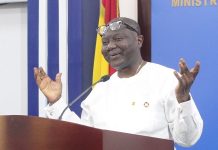When the Committee that was set up by the Chief Justice (CJ) to
investigate then Chairperson of the Electoral Commission (EC) of Ghana,
Charlotte Osei, accused her of breaching the procurement laws of the
country, and therefore recommended for her removal from office, the
nation was divided.
While some, especially, followers of the opposition National Democratic
Congress (NDC) saw the move as witch-hunting and hatred on the part of
the government to kick Charlotte Osei out of office, others were in full
support of the decision, believing that nobody was above the laws of
the land.
However, the adverse findings of the CJ Committee against the former
Chairperson of the electoral management body of the country have been
corroborated by the Auditor-General in his report on “Special Audits
carried out on selected state institutions in the year 2018” and
presented to the Parliament of Ghana for further action.
The CJ Committee had accused Charlotte Osei of blatantly breaching the
procurement laws in the award of several contracts in her three-year
period at the helm of affairs, prior to the 2016 elections.
CJ’s Committee findings
She was investigated over six separate allegations of various
procurement breaches, for which a prima facie case was established
against her, with the committee later recommending for her removal from
office after finding her guilty of the charges brought against her.
The charges had to do with the engagement of the services of lawyers,
Sory@Law, without going through the proper procurement process;
unilaterally abrogating a duly procured contract with a tech company,
STL; decision to acquire a new office block of the commission without
going through the laid down procurement process; and the award of
contract for the construction of pre-fabricated district offices for the
Commission and consultancy works against the procurement laws.
Others were the use of donor support funds for the EC’s ICT environment
project as well as an award to repackage the strategic plan of the
Commission without recourse to the procurement laws of the land.
The setting up of the CJ’s Committee was triggered by a petition
submitted to the President of the Republic, Nana Addo Dankwa Akufo-Addo
by some concerned staff of the EC to probe their boss.
Another petition calling for the head of the then two deputies of the
Commission, Amadu Sulley and Georgina Opoku Amankwa, in the probe was
also presented to the President for consideration.
Award of contracts above available funding
The findings of the CJ Committee has been validated by the audit findings of the Auditor-General.
According to the Auditor-General, a review of a request letter with
reference no. C/EC/PROC/01/SF.24/V.3/8 dated July 26, 2016 to the Public
Procurement Authority (PPA), indicated that the Commission requested to
use restricted tendering for the construction of the 100 District
Offices as well as engagement of consultants at a cost of US$7,500,000
and US$750,000.00 respectively.
However, the contracts were awarded for US$15,127,362 instead of the
Commission’s own estimated amounts of US$8,250,000 approved by the PPA.
That notwithstanding, the Commission led by Charlotte Osei did not seek
approval from the Minister of Finance for the additional contract;
thereby, leading to an unjustified excess expenditure of
US$6,877,362.53.
Additionally, the Commission paid a total amount of GH?4,185,688.08
(US$780,295.97) at current exchange rate) including the cost of
consultancy, for the partitioning and fitting-out the new Head Office as
against the budgeted amount of GH?700,000.00.
The Commission again, according to the report of the audit report, did
not seek approval from the Minister of Finance for the extra cost of
GH?3,485,688.53 (US$649,802.06 at current exchange rate) which the
Auditor-General termed “Unjustified Expenditure”.
That means, a total amount of US$7,527,164.59 was overspent by Charlotte
Osei-led EC without recourse to the procurement laws of the land.
Response
Although Charlotte Osei has been kicked out of office as recommended by
the CJ Committee, the findings of the Auditor-General were still laid
bare before the Procurement Officer of the EC for explanation.
From the report, the Procurement Office explained that the excess
expenditure incurred was not initially factored into the procurement
plan, to enable the Commission request for approval from the Ministry of
Finance.
But his explanation was not convincing enough, spurring the
Auditor-General to advice management of the EC to restrict its
expenditures to the provisions in the budget but not probable inflows,
and use due procedure to prepare and procure approval for supplementary
budget should the need arise.
Since the audit process ends with the Parliament of Ghana, officials of
the election management body are likely to be halted to appear before
the Public Accounts Committee (PAC) for further probe into the matter.
It remains to be seen whether Charlotte Osei will be invited by the PAC
to account for her role in the various contracts she awarded while in
office.









































